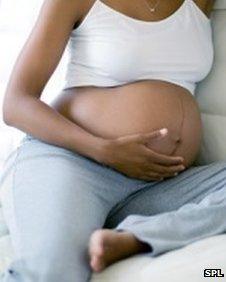Depression in pregnancy 'risk to future mental health'
- Published

Depression can happen during pregnancy too
More than a third of women who become depressed during their pregnancy have suicidal thoughts, suggests a snapshot survey carried out by the Royal College of Midwives and Netmums.
The poll of 260 mothers with antenatal depression found they were at greater risk of worsening mental health problems than women with postnatal depression.
Only 22% sought help from their GP.
Experts say women with the condition need more support.
The Department of Health has announced that £25m will be made available to improve maternity facilities for mothers and babies, and an NHS information service for parents is to include videos on how to spot signs of postnatal depression.
'Greater risk'
Antenatal depression, which occurs during pregnancy, is less known and talked about than postnatal depression, which happens after the birth of a baby.
This small survey suggests that those who suffer from depression during pregnancy are at greater risk of worsening mental health problems than those who have postnatal depression alone.
According to the survey, 80% of women with depression in pregnancy also went on to have postnatal depression.
About 56% of those surveyed had problems during their first pregnancy but almost 66% said they had problems during their second.
Just over half of the women said their illness had affected their relationship with their baby and 38% said they had problems bonding with their baby.
Only 30% were warned about antenatal depression by midwives and most of the women said it took a few months before they realised that they had a problem.
Just 22% sought medical help from their GP at that point - perhaps because only one in three women were aware of the possibility of becoming depressed during pregnancy.
Just 27% reported being asked how they felt emotionally during their pregnancy.
Cathy Warwick, chief executive of the Royal College of Midwives, said the survey showed an urgent need to identify and help women with antenatal and postnatal depression.
"If we can identify women as early as possible then we could prevent them declining into much more serious mental health problems."
'Be open'
Sally Russell, co-founder of Netmums, said depression and anxiety could make life very difficult for parents with a new baby.
"Midwives can do a lot to help and reassure, so they should be open with mothers and fathers-to-be about the condition and trained to spot the signs.
"Those suffering often don't know who to talk to, so it's essential they know they can be open and honest about how they are feeling with midwives."
Health Minister Dr Dan Poulter, who announced the £25m fund to improve maternity services, said hospitals would be able to bid for en suite facilities, rooms where fathers can stay overnight or facilities like birthing pools.
"A new arrival in the family is a joyous time but can present challenges for mums and families, particularly new families. I want to help women and their partners as much as possible," he said.
The NHS Information Service for Parents, external is available to every new parent to sign up to if their chid is under six months old. From next year it will support parents with babies and young children up to 18 months old.
Dr Poulter added: "Women with postnatal depression need care and support, not stigma. That's why early diagnosis for this traumatic condition and support for parents is so important."
In May, the government also pledged to recruit an extra 4,200 health visitors, external and give them training to diagnose postnatal depression.
- Published12 February 2012
- Published11 October 2011
- Published3 March 2011